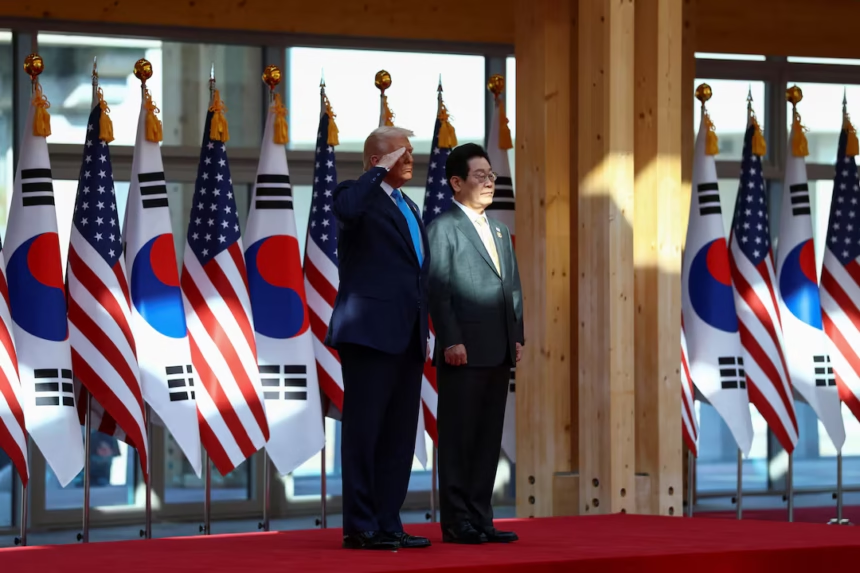U.S. President Donald Trump wrapped up his five-day Asia tour in South Korea, touting trade and security progress with both President Lee Jae Myung and China’s Xi Jinping amid rising regional tensions following North Korea’s latest missile test.
Arriving from Tokyo, Trump was welcomed with a lavish ceremony in the historic city of Gyeongju, where this year’s APEC leaders’ summit is being held. His visit came just hours after Pyongyang test-fired a nuclear-capable cruise missile, though Trump downplayed the incident, saying his focus was on advancing economic deals.
“I think we’re going to have a very good outcome for our country — and for the world, actually,” Trump told reporters aboard Air Force One.
Trade Deals and Tariff Talks
Trump confirmed that discussions with Xi on Thursday would aim to ease U.S.–China trade tensions, including a potential reduction of U.S. tariffs in exchange for Beijing’s crackdown on fentanyl precursor exports. Reports suggest Washington could halve the current 20% levies on Chinese goods tied to the illicit drug trade.
Speaking earlier at the APEC CEO Summit, Trump said a trade deal with South Korea would be finalized “very soon,” though officials have cautioned that major sticking points remain. The two nations had previously announced a tentative agreement in July under which Seoul would invest $350 billion in the U.S., but the structure and timeline of those investments remain unresolved.
During a ceremonial meeting at the Gyeongju National Museum, President Lee presented Trump with the Grand Order of Mugunghwa, South Korea’s highest civilian honor. Trump joked, “I’d like to wear it right now.”
Lee pledged to boost defense spending and requested U.S. approval to reprocess nuclear fuel for submarine reactors — a move currently prohibited without Washington’s consent.
Trump responded by promising to help “straighten out” relations with North Korea, though he acknowledged that a meeting with Kim Jong Un would not occur during this trip.
China, Taiwan, and AI Exports
The U.S. and China are reportedly close to a framework deal to pause further tariff escalation and ease Chinese export controls on rare earths, sending global markets to record highs.
Trump also mentioned plans to discuss AI chip exports — particularly Nvidia’s Blackwell processors — with Xi, calling the issue a “key sticking point” in negotiations.
On the question of Taiwan, Trump said it was “unclear” if the topic would arise. While he has said that Xi assured him China wouldn’t invade Taiwan during his presidency, Trump has yet to approve new U.S. arms sales to Taipei. Taiwan’s Foreign Minister Lin Chia-lung said he was not concerned that the U.S. would “abandon” the island.
End of the Asia Tour
Trump’s South Korea visit capped a busy regional tour marked by major trade and security announcements:
- In Malaysia, he oversaw multiple trade pacts and helped broker a peace truce between Thailand and Cambodia.
- In Japan, he praised Prime Minister Sanae Takaichi, the country’s first female leader, for accelerating military modernization and for pledging $550 billion in U.S. investments tied to tariff relief.
Now in Seoul, Washington is pressing for a similar arrangement with South Korea — though Seoul has proposed phased investments and loans instead of the full upfront payment.
As Trump departs Asia, he leaves behind renewed optimism for trade détente — but also lingering uncertainty over North Korea’s provocations and the fragile balance of U.S.–China relations.







